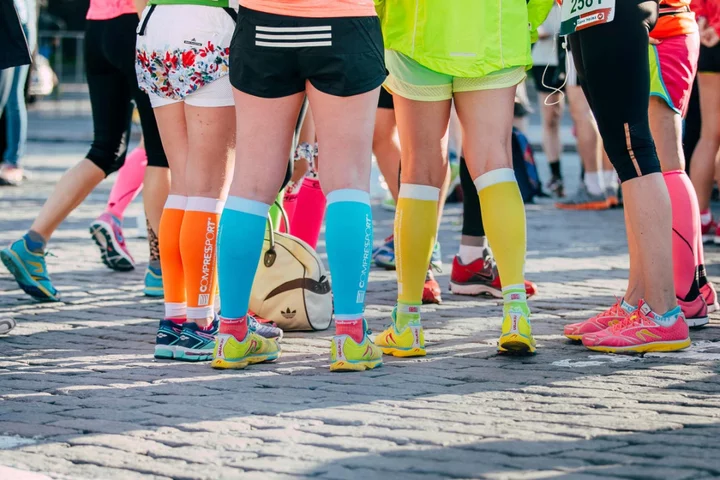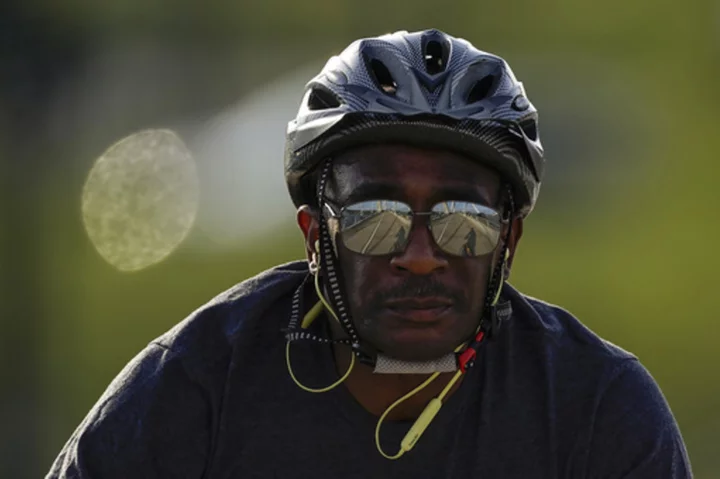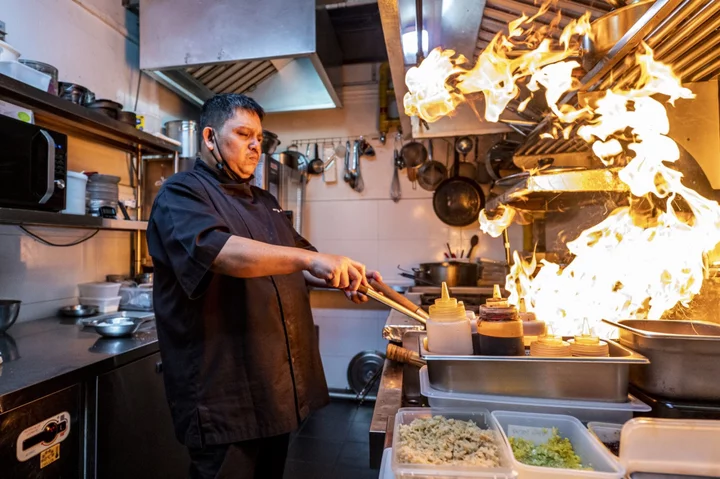
Festival founder hopes to help tackle women’s health taboos
Pelvic floor problems and periods will feature as topics for discussion alongside live music, food and drinks at a festival with a difference this summer. Surgeon Julie Cornish, founder of the Everywoman Festival due to take place in Cardiff next month, said she believes it is the first event of its nature to take place in the UK covering such a wide range of women’s health topics. The mother of three, who specialises in pelvic problems after childbirth, said she hoped to create a relaxed and informal setting where typically taboo subjects can be tackled. She said: “The concept of it is as much about prevention and education, as it is about signposting to women with problems. “I’m not aiming this just at women who’ve got problems, I want 16-year-olds to come along to find out about period sustainability products, what is normal for periods and how to know when you’ve got endometriosis. “I want people to understand what is normal and not normal about aspects of women’s health, particularly pelvic health. And I’d like them to be more comfortable talking about their bodies and the symptoms they might get.” Cornish said she is “all too aware of the barriers people face when trying to start conversations about their health” as she warned that if people do not feel able to speak about their health, they may not be able to access the help they need. The event on June 24 at Insole Court in the city will feature a range of expert speakers and more than 48 interactive workshops including pilates, physio sessions and chair yoga, as well as live music, performance art sessions, food and drinks. Welsh health minister Eluned Morgan is set to take part in a discussion on the day on gender health inequality, while some of the other sessions will focus on sexual wellbeing and childbirth injury. For too long, there have been deep-seated and entrenched inequalities in women’s healthcare Welsh health minister Eluned Morgan Morgan said: “For too long, there have been deep-seated and entrenched inequalities in women’s healthcare – from how women’s experiences are viewed to how symptoms are acted upon; health issues and conditions affecting women have been considered ‘taboo’ subjects, limiting awareness and understanding, resulting in women often suffering in silence. “I am committed to improving women’s experiences and health outcomes. “I’ve tasked NHS Wales with designing and delivering a 10-year women’s health plan, which will address inequities in provision and barriers to access and improving the provision of good-quality health services for women throughout their lives. “But if we are to truly deliver lasting change for all women in Wales, we need to look beyond the boundaries of healthcare and normalise conversations about women’s experiences, taking co-ordinated action to remove gender barriers and inequalities. “I am delighted to be speaking at the Everywoman Festival and I look forward to hearing the experiences of all those attending.” Read More Charity boss speaks out over ‘traumatic’ encounter with royal aide Ukraine war’s heaviest fight rages in east - follow live Get to know Foday Dumbuya, winner of the Queen Elizabeth II Award for British Design 7 beauty changes to make as the weather gets warmer Paparazzo says Harry and Meghan car chase was ‘catastrophic experience’
2023-05-19 18:27

The 2022 Bordeaux Wine Vintage Is Brilliant — and a Big Surprise
At 9 a.m. on Monday, April 17, I was swirling, sniffing, sipping and spitting a stunning barrel sample
2023-05-19 17:55

Nurse who needed the toilet 30 times a day diagnosed with incurable condition
A nurse who needed the toilet 30 times a day was diagnosed with an incurable disease after doctors suspected she had an eating disorder when her weight plummeted. Katie Harpur, 25, a nurse from Belfast, dropped to just five stone while battling the painful symptoms of Crohn’s disease, which left her unable to walk, and she could not eat without throwing up. Diagnosed with Crohn’s in 2014 at the age of 16, she was told it was inevitable that she would eventually need a stoma bag. Fitted with a temporary bag in 2019, Katie had the operation to make her stoma permanent in June 2022 and says it has changed her life. She said: “I used to need to go to the toilet up to 30 times a day and I couldn’t go out and socialise for fear of there not being facilities nearby. “It was incredibly limiting, and I was in a lot of pain to the point where I didn’t even want to go anywhere. “I’d always wanted to travel but it was impossible for me to do so until I got my stoma bag fitted. “Now I’ve booked my first long-haul flight to Tokyo, something I never would have been able to do before the op.” Katie first started experiencing pain and nausea at the age of 14 but said doctors found it difficult to diagnose her. I was in a lot of pain to the point where I didn’t even want to go anywhere Katie Harpur She said: “At first, they suspected that I was bulimic because my weight dropped. “I lost a dangerous amount of weight and weighed just five stone, but I didn’t have an eating disorder, it was just too painful for me to eat and if I did eat, I would vomit. “I remember one doctor told me I was a hypochondriac, but I knew something wasn’t right.” Persevering with medical appointments, Katie said her health deteriorated until she was admitted to hospital. Unable to walk, the then 16-year-old spent two weeks in hospital where she had a colonoscopy. Katie said: “I couldn’t physically walk anywhere, I was so weak, and I ended up in hospital. “The biopsies from the colonoscopy came back and confirmed that I had Crohn’s disease.” Crohn’s disease is a lifelong condition where parts of the digestive system become inflamed. Symptoms include diarrhoea, stomach aches and cramps, blood in your poo, fatigue and weight loss. Growing up, I was so excited to travel but Crohn’s made it impossible. Katie Harpur Katie was put on medication but was told she would eventually need a stoma bag. In June 2019, Katie, then aged 21, underwent a procedure to have a temporary stoma bag fitted. She said: “Going into it, I obviously had body image concerns because I’m still quite young and people tend to have a false idea that stoma bags are dirty. “I knew I would end up with a giant scar too and that made me nervous.” Despite the stoma bag being the solution to Katie’s painful symptoms, she suffered complications which led to her having the procedure reversed. Battling infections and prolapse, her stoma was removed in January 2020. With her symptoms returning, Katie made the decision to have a permanent stoma bag fitted in June 2022. She said: “Because there were so many issues with the first one, I was really nervous, especially as this stoma couldn’t be reversed. “But my condition had gotten so bad and I was in so much pain, that this was really the only option for me at this point.” I hope people can see my experience and know that stoma bags aren’t scary Katie Harpur As Katie approaches 12 months since her stoma operation, she said the procedure has “changed her life”. With no complications or symptoms, she is now able to travel and socialise with friends. “I’ve had no issues at all with it and it’s honestly the best thing I’ve ever done,” she said. “Growing up, I was so excited to travel but Crohn’s made it impossible. I always said I wouldn’t travel far until I had my stoma fitted.” Since her operation, Katie has booked a three-week trip to Tokyo for September this year, something she says she never would have been able to do before. She said: “Not being able to speak Japanese, I would have found it very hard to find a public toilet so wouldn’t have been able to do the trip before. “But now I’m planning to go to Mount Fuji and Super Nintendo World, which I’m really excited for.” Now she is raising awareness for Crohn’s disease on World IBD Day and hopes to break the stigma around stoma bags. “A lot of people think having a stoma bag is the end of the world,” she said. Now I’ve booked my first long-haul flight to Tokyo, something I never would have been able to do before the op. Katie Harpur “I was so young getting mine done and I was nervous about how my body would change but it’s the best thing I’ve ever done, I wish I’d done it sooner. “I hope people can see my experience and know that stoma bags aren’t scary, mine has greatly improved my life and enabled me to start enjoying life again.” Sarah Sleet, chief executive of Crohn’s & Colitis UK, said: “There are more than 500,000 people living with Crohn’s and colitis in the UK. Every day we hear about more who are experiencing symptoms and waiting for a diagnosis. “Since the pandemic, the already lengthy waiting times for tests like endoscopies and colonoscopies have soared. “Such delays can be devastating for people, affecting their ability to work, study, socialise and live the lives they want to. “We really need to do more to help young people stay in control of their health, and that means providing them with the tools to get the right diagnosis from their GP as early as possible. My stoma bag has greatly improved my life and enabled me to start enjoying life again Katie Harpur “If you’re experiencing blood in your poo, tummy pain or frequent, urgent diarrhoea, then the symptom checker on our website is a good place to start. “It’s designed to give people the confidence to go to their GP with a letter detailing their symptoms, to help them get the right diagnosis and get back on the road to recovery.” For more information, visit: www.crohnsandcolitis.org.uk. Read More How to check if you have skin cancer: Symptoms and signs to look out for Janey Godley shares heartbreaking cancer update New obesity jab that sparked diabetes row in US could get NHS green light Charity boss speaks out over ‘traumatic’ encounter with royal aide Ukraine war’s heaviest fight rages in east - follow live
2023-05-19 17:46

7 beauty changes to make as the weather gets warmer
As the weather starts to (slowly) warm up, it’s time to rethink your beauty routine. When temperatures change and the sun shines a bit more consistently, the same products you used in winter won’t be quite as effective. Your hair and skin will have different needs – and these are the changes you should make to accommodate this… 1. Wear broad-spectrum SPF You should be doing this all year round, but slapping on the SPF becomes even more crucial as the weather warms up and we see what Dr Carlos Charles, 4.5.6 Skin chief medical officer and co-founder, describes as “increased daily ambient outdoor ultraviolet light”. He recommends adding sun protection into your routine as early as spring – even if it doesn’t feel that warm. “In my patients with a more fair complexion I’ll start to see mild sunburns and an uptick in sun spots known as solar lentigines in the early spring months,” Charles says. “In patients with darker melanin-rich skin tones I’ll begin to see exacerbations of the pigmentary disorder known as melasma, as well as more intense examples of various types of hyperpigmentation.” Charles – who has spent most of his career treating melanin-rich skin – adds: “The best way to mitigate the hyperpigmentation is through the strict daily use of a broad spectrum sunscreen that is at least SPF 30.” Skin Proud Serious Shade SPF 50+ Sunscreen, £16.95 2. Combat increased oil production “In the warmer weather when temperatures and humidity rise, our sebaceous glands tend to overproduce sebum to keep skin hydrated,” explains Charles. “Even those who have normal skin may find their complexion becomes more oily or greasy. This is true across skin tones, but particularly for those with darker skin.” However, oilier skin doesn’t mean you should start triple-cleansing. “One of the most common mistakes I see patients make when their skin gets oily is over-cleansing to remove the excess oil. Unfortunately, this creates the opposite effect, as it can send the sebaceous glands into overdrive, producing more sebum,” says Charles. Instead, he recommends using “gentle and non-stripping” cleansers and adopting ingredients that will combat the increased oil production, such as salicylic acid. 4.5.6 Skin Green Bae Clearing Gel Cleanser, £28 3. Boost the moisture in your skin Charles continues: “Another mistake I see patients make when their skin gets oily is skipping their moisturiser – or worse SPF – for fear of looking shinier. “It’s always important to keep skin well-nourished and hydrated so that sebaceous glands don’t overcompensate.” Equally, Dr Preema Vig at Dr Preema London recommends using products with ingredients that will boost your skin’s moisture, including hyaluronic acid, ceramides, glycerin and squalane. Croma Skincare Hyaluronic Acid Face Mask, £48 4. Give your scalp some love Skincare doesn’t stop at your face. “In the summer months, our scalp can often be neglected and suffer – whether that be from sun exposure and sweating to tying the hair in restrictive, high-stress ponytails due to the heat,” says Munir Somji at DrMedispa. “These hairstyles, alongside heat damage from the sun, can cause hair to lose volume and break easily.” That’s why it’s important to give your scalp some love during the warmer months – by wearing looser ponytails, using targeted treatments or even giving yourself a scalp massage. 5. Don’t forget your eye area“Skin can become red and inflamed during the summer months, caused by blockage and inflammation of your sweat ducts,” says aesthetic oculoplastic surgeon Sabrina Shah-Desai. “Don’t forget to treat your eye area. When it comes to the delicate eye area, think about investing in some slightly larger sunglasses for extra protection, alongside a product to treat any pigmentation and protect.” Caudalie Vinoperfect Brightening Eye Cream, £30, Look Fantastic 6. Protect your hair, too It’s not just your skin that needs SPF – your hair could benefit from it too when the sun starts shining. “Warmer weather can cause your hair to become dry, frizzy and more prone to breakage due to increased exposure to UV rays, humidity and sweat,” says GHD UK ambassador and celebrity hair stylist Samantha Cusick. “The sun’s ultraviolet (UV) radiation can damage the proteins in your hair, which can lead to dryness, brittleness, and breakage. Additionally, sun exposure can also cause your hair colour to fade and lose its vibrancy.” The key to protecting your hair from the sun’s rays? Cusick recommends “wearing a hat or using a hair product that contains SPF”. Coola Scalp & Hair Mist Sunscreen SPF 30, £29, Feel Unique 7. Battle the frizz “Humidity can cause hair to absorb moisture from the air, which can lead to swelling and frizz. This is because hair is made up of keratin proteins, which can change shape when exposed to water. Additionally, the moisture can disrupt the hydrogen bonds in hair, leading to frizz,” Cusick explains. To beat the frizz, opt for anti-frizz products and always use heat protectant – and Cusick recommends using a tool such as the GHD styler that goes up to 185 degrees: “The optimum temperature to style hair,” she says. Kerasilk Liquid Cuticle Filler, £24, available in selected salons GHD Platinum+ Hair Straightener in Sun-Kissed Taupe, £239 Read More Charity boss speaks out over ‘traumatic’ encounter with royal aide Ukraine war’s heaviest fight rages in east - follow live Paparazzo says Harry and Meghan car chase was ‘catastrophic experience’ Miley Cyrus: As an adult I now realise how harshly I was judged as a child Common foot problems faced by runners – and how to solve them
2023-05-19 16:59

Common foot problems faced by runners – and how to solve them
Whether you’re taking on a marathon or running a 5k parkrun, your feet will make or break a run and a problem could put you off the activity for good. “Runners’ feet take a real battering, as you will know if you have recently run a marathon or even if you are new to running,” says GP Dr Gill Jenkins, an adviser to Excilor. “Feet bashing on hard ground, sweaty socks and shoes can all play havoc with your feet.” So, what problems could you face and how can you stop them hindering your progress? Blisters “Hot and sweaty feet usually mean blisters. As you start to run, your feet sweat, and the moisture in your shoes can cause friction, leading to blisters, says Joss Baldwin, Runners Need buyer. “Investing in a pair of running shoes made from breathable fabrics, with mesh vents on the uppers, boost airflow and allow any moisture to escape your shoes – reducing your risk of blisters,” “It’s also important to ensure your running shoes fit properly – shoes that are too tight or too loose increase the chance of rubbing and friction, only adding to the likelihood of blisters occurring.” Many trainer brands and sports shops such as Runners Need and ASICS offer gait analysis to help you choose the best-fitting shoes. “While breathable trainers are vital, wearing the appropriate socks will reduce your risk of soreness and rubbing. Invest in a good pair of technical run socks to keep your feet cool and wick the moisture away from your skin. Features to look out for are technical and sweat-wicking fabrics, mesh ventilation under the arch, as well as a snug fit,” says Baldwin. Athlete’s foot “Athlete’s foot is a fungal infection that occurs between the toes but can spread to the top and bottom of the foot if not treated. It can be very itchy and sore if the skin breaks, plus it spreads quickly in damp environments including running shoes but also changing rooms,” says Jenkins. It should not be ignored, and there are plenty of quick and easy treatments available in pharmacies. Ankle pain “When you’re first getting into running, foot problems can be common, but the good news is they are mostly avoidable,” says Baldwin. “Sometimes it is simply a case of getting your body used to the new activity, but all the time we see new runners in shoes that aren’t right for them. Overpronation, where your foot rolls in excessively, poor fitting and worn-out cushioning can cause a myriad aches and pains in your body. All are really easy to correct by getting a proper shoe fit and gait analysis.” There are different shoes for different activities that can protect your ankles and feet. “Everyone’s feet are different and that means everyone’s running shoe requirements are unique. Choosing the right shoe for your run can help avoid ankle pain,” says Baldwin. “If most of your training is on pavements, then road shoes are for you. With more cushioning than trail or lightweight race shoes, these will provide shock absorption to minimise your risk of injury. If you’re running through soft, muddy trails, you’re better off in a pair of trail shoes with a deep tread that offers better grip and ankle support, vital for running on uneven terrain. On pavements, however, these shoes will be uncomfortable as the studs will press into the soles of your feet and will wear away quickly.” He adds: “If you’re doing a little of each, you should consider a hybrid running shoe. These shoes work well on both roads and mixed trail conditions with a balanced mix of grip and cushioning.” Toenail problems “Toenail problems are commonly caused by a fungal infection and research for Excilor showed 49% of sufferers not aware they had a fungal nail infection,” says Jenkins. “Infections are incredibly common, especially with runners, and are also highly contagious, thriving on damp feet. Symptoms include discoloured nails and itchy and painful feet. Treat nail infections immediately as they can worsen rapidly.” Similarly, running long distances may damage the toenail itself. “The longer we run the warmer our feet get,” says Baldwin. “As they get warmer, they actually start to swell and become bigger. It is really important to take this into account when selecting your shoes. Typically we need to size our running shoes bigger than our normal shoes to stop our toes hitting the end of the shoe, which can cause our toes – and toenails – to become sore or bruised.” Read More Charity boss speaks out over ‘traumatic’ encounter with royal aide Ukraine war’s heaviest fight rages in east - follow live Paparazzi driver says Harry and Meghan chase was ‘catastrophic experience’ Regular exercise may lower risk of women developing Parkinson’s disease – study Number of children trying vaping rises 50% in a year
2023-05-19 15:50

Overseas Travel Costs for Indians Set to Rise on Credit Card Tax
India has decided to levy a higher tax on international card spends from July as the government aims
2023-05-19 15:22

At graduations, Native American students seek acceptance of tribal regalia
For Native American students, tribal regalia is often passed down through generations and worn at graduations to signify connection with the community
2023-05-19 13:57

On US Bike to Work Day, here's how COVID, eco-thinking made cycling better in cities worldwide
During the worst of the pandemic, outdoor recreation surged as people took up pursuits to escape isolation
2023-05-19 13:30

Thai Coalition Talks Spook Markets Amid Split Over Law on Royals
Thailand’s pro-democracy parties faced built-in obstacles to forming a government even before a historic win in Sunday’s election.
2023-05-19 12:56

Awash in social media, how are police learning to inform the public better after shootings?
Social media has law enforcement facing increasing pressure to release information fast amid a surge of mass shootings
2023-05-19 12:52

Singapore’s World-Class Gastro Cred Imperiled by Staffing Woes
Singapore restaurant owners are sending a message to the government that the nation’s status as a gastronomic center
2023-05-19 08:27

McDonald’s fans are shocked to learn the purpose behind the buttons on drink lids
McDonald’s lovers had their minds blown after seemingly learning the purpose behind the buttons on the top of drink lids. This week, a video posted on the popular Twitter account Today Years Old went viral after it showed the reason for those fun-to-pop buttons on every McDonald’s soda. The plastic buttons – sometimes labelled “Diet”, “Cola”, “Tea”, and “Other” – allow workers to indicate what the customer ordered so that they’re given the correct drink. For example, if someone ordered a Diet Coke at a McDonald’s drive-thru, they’d be handed a drink with the “Diet” button pushed down on the lid, while the other buttons remained unpopped. However, true fast food fans will also notice the rectangular buttons on the plastic lid. In the viral video, which has more than two million views, a person shocked McDonald’s fans when they pushed down on the wrong circular button and used the rectangular one to correct their mistake. “I was today years old when…” they captioned the clip, which showed that if the rectangular button was pressed, the circle next to it immediately popped up. In the comments, many users concluded that the plastic lid is used like a “reset” button – if an employee accidentally indicates the wrong drink preference, they can use the rectangular button to make sure the customer is given the right drink. “What kind of sorcery is this?” tweeted one mind-blown person after discovering the purpose behind the plastic button. “This is a lie! This can not be true!?!?! Can it???” another user jokingly asked. “At this point I don’t even think I’m breathing correctly,” said someone else. Others took the opportunity to seemingly confirm the purpose of the button, with one person writing: “The cap is to mark what the drink is (let’s say the diff between Diet Coke and Coke) this allows you to redo if you pressed the wrong one.” “There is an undo function,” one person replied, while another said: “Whaaatt? Those were reset buttons?” Most recently, fans of the American fast food chain expressed their disappointment after learning “why McDonald’s fries taste different than everybody else’s fries”. TikTok user Jordan, who goes by @jordan_the_stallion8 on the app, revealed that McDonald’s beloved fries are cooked with “natural beef flavour”, making them not suitable for vegans. “It’s because McDonald’s cooks [its] fries with beef flavouring mixed within their vegetable oil,” Jordan said. “So that’s why the fries taste so good, but also so different from everybody else’s.” @jordan_the_stallion8 #stitch with @youraveragetechbro #fypシ ♬ original sound - Jordan_The_Stallion8 The TikToker then noted that the revelation was probably “bad news for vegetarians”. The realisation upset many vegan and vegetarian customers, with one person commenting: “Wait.. whaaaat!? I’m vegan and all I can eat from McDonald’s are fries.” “WTF. Never again,” another said. Others revealed that it is a well-known fact that McDonald’s fries are not vegan in the US. “I thought everyone knew this,” said one person, while someone else wrote: “This has been known for at least a decade.” The Independent has contacted McDonald’s for comment. Read More McDonald's found liable for hot Chicken McNugget that fell from Happy Meal and burned girl Woman shares dismay over ‘mouse-sized’ panini she purchased for $8 on vacation in Italy McDonald’s fans upset after ‘expert’ claims he knows why fries taste different What is coronation chicken? The story of the royal recipe and how to make it Woman shares dismay over ‘mouse-sized’ panini she purchased for $8 on Italy vacation Gordon Ramsay puts his spin on a traditional Maori dessert
2023-05-19 06:53
